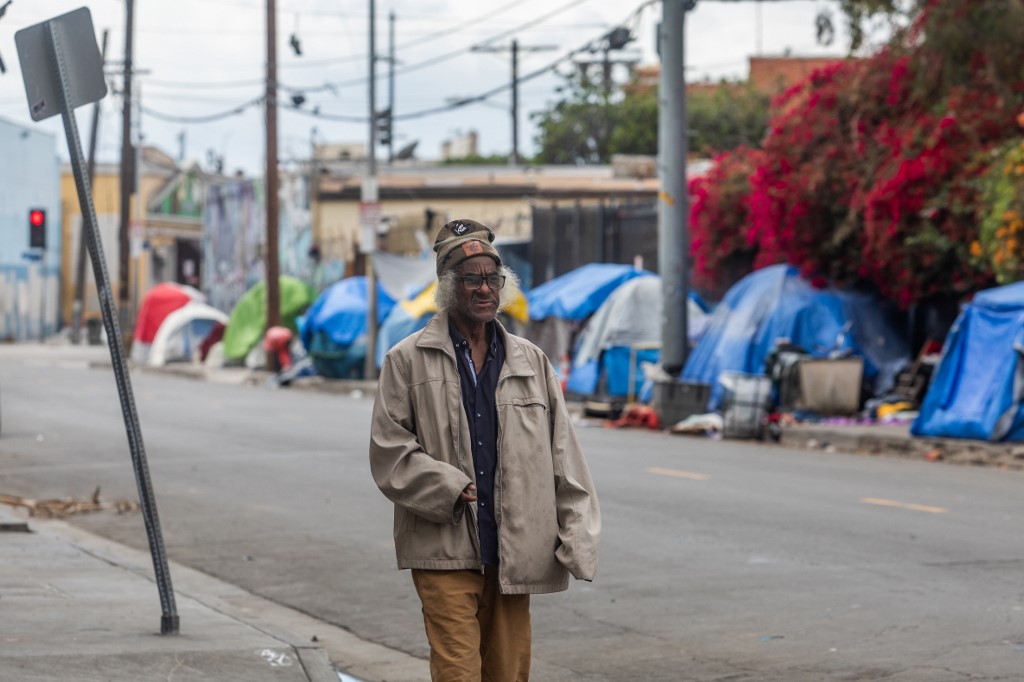California struggles to protect homeless as coronavirus spreads

A homeless person walks on San Julian Street in the Skid Row area in downtown Los Angeles, California on March 19, 2020. (Photo by Apu GOMES / AFP)
LOS ANGELES — Officials in California are scrambling to protect the state’s huge homeless population from COVID-19 amid warnings that should the virus spread within that community it could prove impossible to contain.
“I think there’s considerable fear and anxiety, especially for those of us who have a deep caring for those who are not only the most vulnerable but the most susceptible,” Los Angeles Mayor Eric Garcetti said earlier this week during an emergency federal-court hearing on the subject.
“Most vulnerable because they’re much more likely to have underlying health conditions.”
The hearing was related to a lawsuit filed by a local group of business owners, residents and others concerned about the squalid conditions facing homeless people living on the streets or in their cars in the city’s downtown.
California’s homeless population of 150,000 is the largest in the nation. Some 60,000 of them live in Los Angeles County.
Article continues after this advertisementGovernor Gavin Newsom warned this week that as many as 60,000 homeless in the western state risk contracting the deadly virus. He said he was releasing $150,000 million in funds to protect that population.
Article continues after this advertisementTwo-thirds of the funds will go to local governments for shelter support and emergency housing and the rest will be used to purchase travel trailers and lease rooms in hotels and other facilities, Newsom said.
“Helping these residents is critical to protecting public health, flattening the curve and slowing the spread of Covid-19,” he said.
So far, the disease has claimed only one confirmed death among California’s homeless, but aid groups and activists warn that the numbers are likely to spike as the virus spreads.
“We are really working hard to keep people safe and our services intact,” said Georgia Berkovich, a spokesperson for The Midnight Mission in Los Angeles. That non-profit is located near the city’s Skid Row neighborhood, which has the nation’s biggest concentration of homeless people living and sleeping on public sidewalks.
Berkovich said her organization in the last week has seen a significant uptick in the number of homeless coming in for meals and other services.
“Typically, at this time of the month, we would serve approximately 400 people during our lunch service,” she told AFP. “But we’re seeing upwards of 800 people now and more than 900 at dinner.”
‘It affects everyone’
Berkovich warned that as other NGOs and churches in the area reduce their meal services because of virus-related restrictions and stay-at-home orders, the homeless population will become even more vulnerable.
Supplies such as disinfecting cleaners, disposable gloves and to-go containers are also in short supply, making things more difficult for her organization, she said.
“If this virus were to affect our homeless community, that affects everyone,” Berkovich said. “I just can’t even imagine if we get a case in our community, how quickly that will spread.”
Garcetti said Friday that more than 1,000 beds had been provided at eight shelters this week and he expected more beds to be put in place during the weekend at 13 recreation centers across the city.
“We are moving forward with a plan to house people at a total of what will become 42 sites in the weeks to come,” he added.
But some homeless families are not waiting for the slow wheels of government to act and have been taking matters into their own hands, claiming vacant state-owned properties in the Los Angeles area.
Martha Escudero, 42, moved into a vacant two-bedroom home in the east Los Angeles neighborhood of El Sereno last week, hoping to ensure her two young daughters remain healthy during the pandemic. Several other families have taken over similar state-owned homes in the neighborhood.
Escudero, who works as a caregiver, said she had been living with family and friends for the past 18 months, unable to afford skyrocketing rental prices in the area.
“This pandemic is a worldwide crisis and the government is really slow in offering people resources,” she told AFP.
“The most vulnerable are those on the streets, and they need to be able to keep up with their hygiene, especially now that parks, gyms and libraries (where in normal times they could wash up) are closed.”
For more news about the novel coronavirus click here.
What you need to know about Coronavirus.
For more information on COVID-19, call the DOH Hotline: (02) 86517800 local 1149/1150.
The Inquirer Foundation supports our healthcare frontliners and is still accepting cash donations to be deposited at Banco de Oro (BDO) current account #007960018860 or donate through PayMaya using this link.